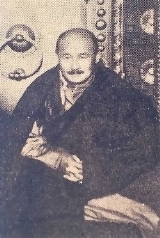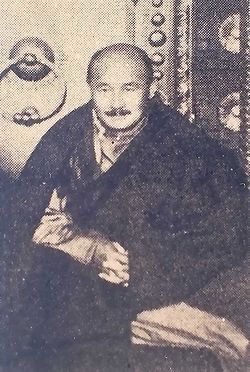
Lubsan Sharab Tepkin
Encyclopedia

Priest
A priest is a person authorized to perform the sacred rites of a religion, especially as a mediatory agent between humans and deities. They also have the authority or power to administer religious rites; in particular, rites of sacrifice to, and propitiation of, a deity or deities...
of Kalmyk
Kalmyk people
Kalmyk people is the name given to the Oirats, western Mongols in Russia, whose descendants migrated from Dzhungaria in 1607. Today they form a majority in the autonomous Republic of Kalmykia on the western shore of the Caspian Sea. Kalmykia is Europe's only Buddhist government...
origin who was born in the Bokshirgankan aimak in the Salsk District of the Don Cossack Host sometime in 1875.
Lubsan Tepkin was born to Dandun Tepkin, a horsebreeder and a member of a prominent family. He joined the Kalmyk clergy at a young age and became Baksha of the khurul in his native aimak by the age of 28 in 1903. In so doing, Lama Tepkin replaced Menko Bormanzhinov
Menko Bormanzhinov
Menko Bormanzhinov was a Buddhist priest of Kalmyk origin who was born in the Bokshirgankan aimak in the Salsk District of the Don Cossack Host sometime in 1855....
who became Lama of the Don Kalmyks. In 1911, Lama Tepkin abdicated his position and moved to Tibet
Tibet
Tibet is a plateau region in Asia, north-east of the Himalayas. It is the traditional homeland of the Tibetan people as well as some other ethnic groups such as Monpas, Qiang, and Lhobas, and is now also inhabited by considerable numbers of Han and Hui people...
, where he would remain until the fall of 1922.
Lama Tepkin moved to Petrograd, Russia
Russia
Russia or , officially known as both Russia and the Russian Federation , is a country in northern Eurasia. It is a federal semi-presidential republic, comprising 83 federal subjects...
in the fall of 1922 to become a deputy Tibetan envoy and a lecturer in Mongolian and Tibetan at the Leningrad Institute of Oriental Living Languages. Three years later in 1925, Lama Tepkin traveled to the Kalmyk Autonomous Oblast to attend the second conference of the Kalmyk Buddhist clergy where he was elected the Šajin Lama of the Kalmyk people.
Lama Tepkin held the position of Šajin Lama until his arrest by the NKVD
NKVD
The People's Commissariat for Internal Affairs was the public and secret police organization of the Soviet Union that directly executed the rule of power of the Soviets, including political repression, during the era of Joseph Stalin....
in 1931. He was sentenced to imprisonment without a formal trial by an NKVD tribunal. Lama Tepkin reportedly spent the last years of his life working as a clerk on a dairy farm near Tashkent where he was last heard of in 1941.

